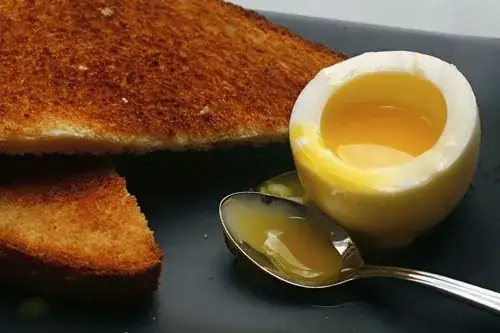I suppose that you with "cook at N°C" mean that the components coagulate or turn solid?
Although all the egg's fat is contained in the yolk, the fat is not relevant for the different temperatures, at which egg whites and egg yolk turn solid. The process causing this is the so called denaturation of the proteins contained in the egg. The concept of denaturation is actually a broader subject and depending on the actual type of protein, the denaturation causes different chemical changes to the protein molecules, it can be triggered by different means and may or may not be reversible. As opposed to the proteins contained in eggs, milk proteins are for example not particularly sensitive to heat. You can heat milk to high temperatures without causing any reaction in the milk proteins. Adding even small amounts of acid (e.g. lemon juice) will however cause the milk proteins to denaturate at low temperatures and flock out as cheese curd.
Back to the egg ... Both in the egg white and in the yolk, many different kind of proteins are dissolved in the watery substance of a fresh egg. You can find about 40 different proteins in the egg white and a mostly different, but just as comprehensive mix in the egg yolk. Most of these proteins denaturates by rearranging the molecular structure in such a way that they loose water solubility and turn in to a more or less solid structure. Depending on the exact protein, the denaturation starts at different temperatures and progress at different speeds. I don't have a complete list of the denaturation temperature of all the egg proteins, but as a rule of thumb, most proteins in the egg white denaturates between 62 and 65°C, while the proteins in the egg yolk lies between 65 and 70°C. Especially in case of the egg yolk, the denaturation is a gradual process, starting with the yolk thickening but remaining liquid, before it actually becomes solid above 70°C. This can easily be seen when using egg yolk as a thickening agent for sauces or deserts. The sauce will start to thicken at roughly 65°, but if you reach 70°, the egg yolk may instantly turn solid and flock out (just as when adding acid to milk).
